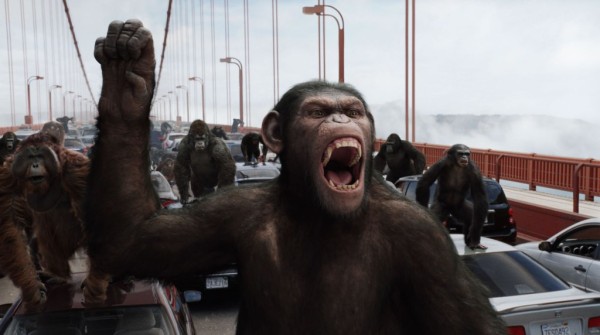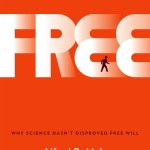‘Rise of the Planet of the Apes’ and the Dangers of Consequentialism
by Bishop Robert Barron
Filed under Movies/TV
The 2011 film “Rise of the Planet of the Apes” belongs to a genre that goes back at least to Mary Shelley’s nineteenth century masterpiece Frankenstein, for it tells the story of well-intentioned scientist who, through ignoring legitimate moral limits, courts disaster.
James Franco plays a San Franciscan DNA researcher called Will Rodman, who is specializing in the treatment of brain disorders, especially Alzheimer’s disease. Under the sponsorship of a large pharmaceutical company, he is conducting experiments on apes and chimpanzees in order to see whether he can increase their intelligence through the introduction of a retrovirus. When one of the chimps gives birth, Rodman takes the infant ape home to raise him and monitor his development. From the start, he is stunned by the young chimp’s mental acuity and rapid progress. By the time he is three years old, the simian—whom he has named “Caesar”—has outstripped most of his human counterparts in intelligence, problem-solving, and communication.
As we follow Caesar’s progress, we also learn why Will is so interested in Alzheimer’s research: his father, Charles, played by John Lithgow, is suffering from the disease. His father’s situation becomes so dire that Rodman resolves to steal some of the experimental drug that was used on Caesar’s mother and to try it on his own poor father. The results are staggering. The morning after being injected with the substance, Charles springs to life, becomes alert to his surroundings, and even resumes his energetic playing of classical piano. But in short order, Charles’s Alzheimer’s reasserts itself as his immune system fights off the retrovirus and his condition rapidly deteriorates. Undaunted, Will begins to experiment on an even more powerful form of the virus, which does indeed dramatically enhance the intelligence of apes but which proves fatal to humans who are exposed to it.
All this time, Caesar, his intelligence deepening and his self-confidence increasing, begins to chafe at being cooped up in the house and treated, more or less, as a pet. When Charles is mistreated by a neighbor, Caesar bursts from the house and brutally attacks the aggressor, compelling Will to remand the clever chimp to a state facility, where Caesar simmers with resentment and manages to organize the other apes into an effective fighting force.
I won’t go much further into the details of the plot. Suffice it to say that the intelligent apes, led by Caesar, break free from their bondage and commence to wreak havoc in the city of San Francisco, even as the human population begins to succumb to the ill effects of the retrovirus.
Now this film is certainly a well-made sci-fi thriller, but it’s more than that, for as I suggested above, it speaks some hard truths about science and about the all too human tendency to indulge in consequentialist moral reasoning. No serious person doubts that the sciences have proven themselves an enormous boon to the human race, but when they are untethered to moral restrictions, the sciences can indeed become dysfunctional, even disasterously so.
Despite the protests of many ethicians at the time, and even of some of the scientists involved, the Manhattan Project researchers went ahead with the development of a weapon that, they knew, would certainly result in the deaths of countless non-combatants—and the world has been haunted ever since by what they produced. Today, many in the scientific community are clamoring for the right to do embryonic stem-cell research in order to effect cures to many of the most devastating medical conditions, including Alzheimer’s disease. (Here the link to “Rise of the Planet of the Apes” is, methinks, far from accidental).
In both cases, well-intentioned people tried (and are trying) to address very real evils, but they used (and are attempting to use) means that are morally problematic, namely the direct killing of the innocent. The temptation toward consequentialist or “end justifies the means” moral reasoning is always a powerful one—and it is on clear display in “Rise of the Planet of the Apes.”
Will wants desperately to help his father and the millions of others who suffer from a terrible disease, and he opts, therefore, to use highly questionable means to achieve his end, resulting in chaos. I can’t help but think that the script-writers were intentional in their naming of the central character in the film, for he is, above all, a man of will, indeed good will, but determined to do whatever it takes to achieve his end.
The earliest theologians in the church read the great permission that God gives to Adam and Eve in the Garden—“eat from all the trees of the Garden”—as the ground of Christian humanism. God wants his human creatures to flourish in every arena: politics, sports, philosophy, culture, science. But they read the great prohibition—“from the tree of the knowledge of good and evil you shall not eat”—as an insistence upon the moral strictures that must surround and condition any human endeavor.
When that prohibition was ignored, the Bible teaches, the human project foundered, for no human being can, with impunity, arrogate to himself the prerogative of transgressing moral limits. In its own way, and within the context of its own peculiar story, “Rise of the Planet of the Apes” is making much the same point.
Related Posts
Note: Our goal is to cultivate serious and respectful dialogue. While it's OK to disagree—even encouraged!—any snarky, offensive, or off-topic comments will be deleted. Before commenting please read the Commenting Rules and Tips. If you're having trouble commenting, read the Commenting Instructions.













